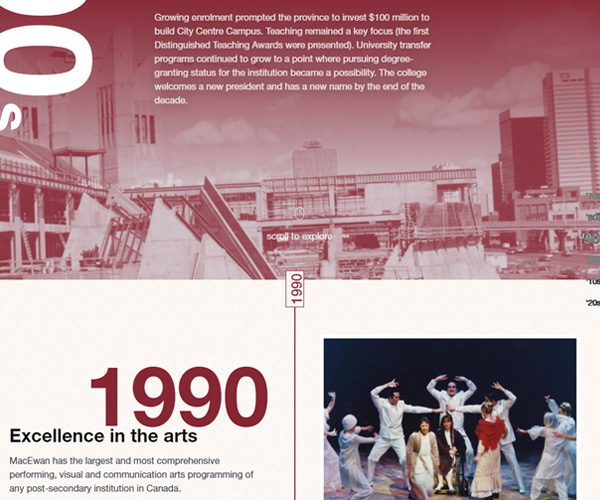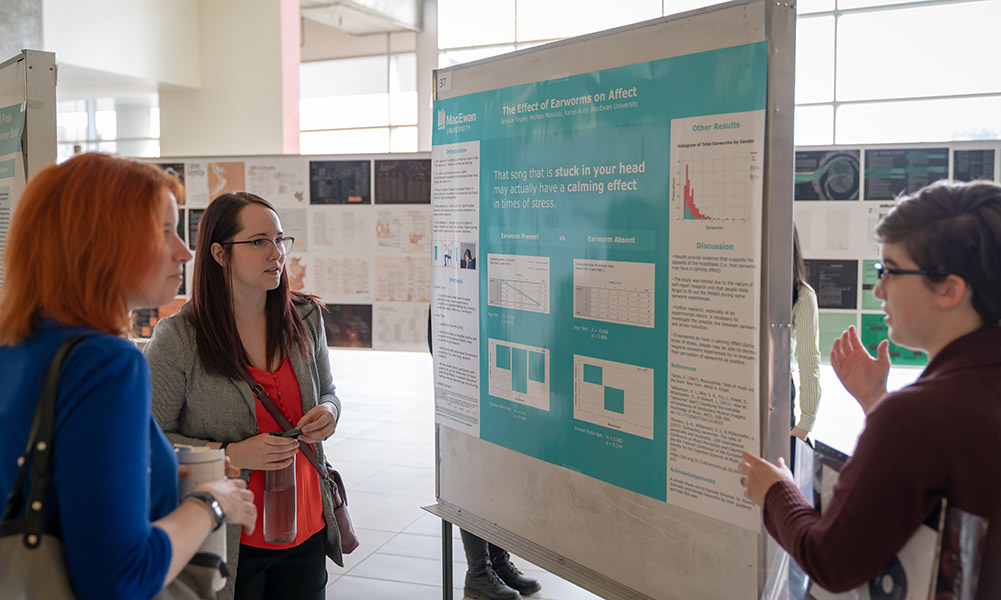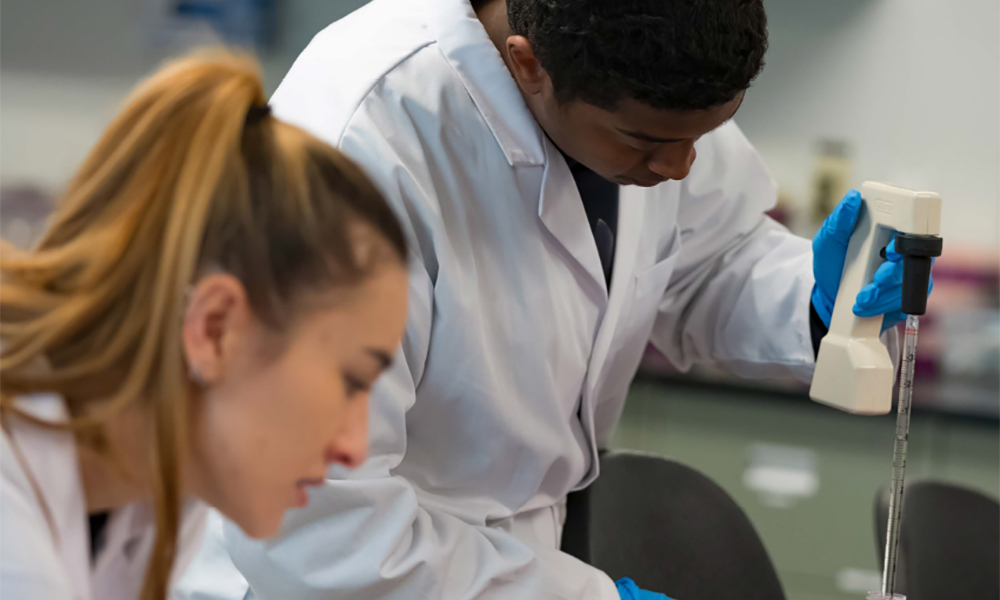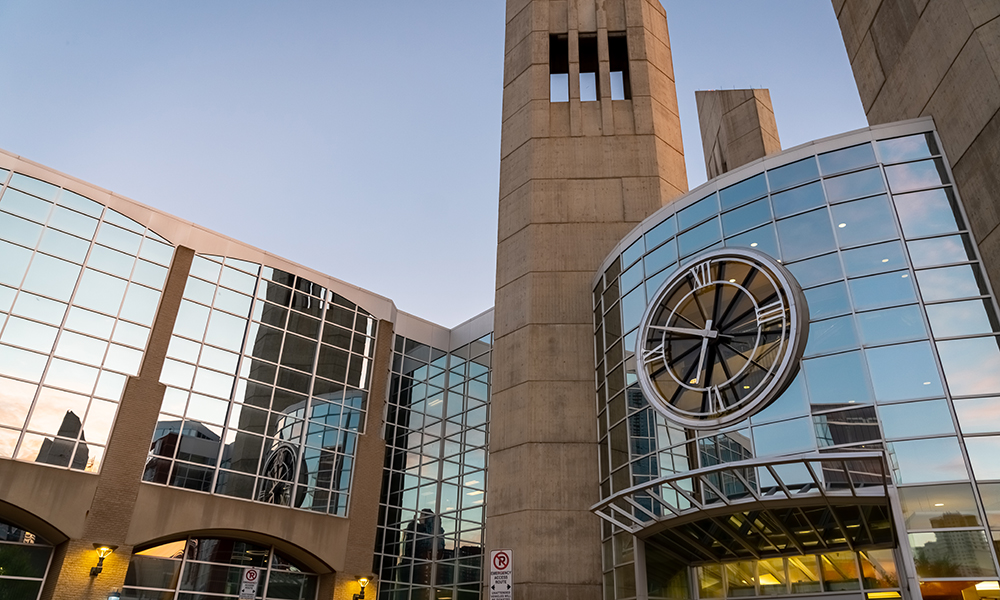One of MacEwan University’s many transformations over the past 50 years involved growing research and creative activity in a way that blends its commitment to students, teaching focus and community engagement.
While never officially part of MacEwan's original scope when the community college first opened its doors in 1971, scholarship has become a key part of the university’s work over the past two decades.
“We were founded to teach, and that foundation has framed – and continues to frame – our institution’s approach to scholarship,” says Dr. Craig Monk, provost and vice-president, Academic. “At MacEwan, research and creative activity complement teaching, and vice versa. Each is done for the benefit of our undergraduate programs.”
That approach is clearly outlined throughout the university’s new strategic vision Teaching Greatness: Strategic Vision 2030, where words like trendsetters, trendbreakers, innovation, creation and discovery appear repeatedly.
But longtime faculty members, including anthropology professor Dr. Cynthia Zutter, can remember a time before the university formalized its research program. She was among the handful of researchers in the early 2000s who were conducting their own scholarly activity or collaborating with faculty at other institutions in the days before MacEwan was eligible to receive and hold Tri-Agency funding.
That all changed in 2004, when Dr. Zutter received the first Social Sciences and Humanities Research Council (SSHRC) grant awarded to a faculty member MacEwan for her archaeological research project, “Palaeoethnobotanical research in Northern Labrador.”
"Receiving MacEwan's first grant was incredibly exciting and the beginning of the road to further success in national research support and awards," she says. "I knew that being a SSHRC holder meant I would be able to conduct the research I wanted and needed to do, and that I would be able to offer opportunities for my students to contribute as well.”
Student involvement, says Dr. Zutter, was a key reason she received the prestigious and highly competitive grant. During the first few summers in the field conducting the project, she brought five students with her to northern Canada.
But Dr. Zutter and her students weren’t the only ones to benefit. Receiving that first SSHRC grant also paved the way for other MacEwan faculty members too – Dr. Peter (Korbla) Puplampu and Dr. Sandra Rollings-Magnusson followed in quick succession, receiving SSHRC awards in 2005 and 2006, respectively.
 View the timeline
View the timeline
As more faculty members pursued scholarly activity and received Tri-Agency funding, the university’s internal support system grew. Research policies were developed, a Research Ethics Board was established, and the Office of Research Services was created to help faculty members grow their scholarly programs, provide internal funding, and navigate the external funding process.
Just as researchers in the social sciences at MacEwan in the early 2000s and 2010s had to figure out other partnerships to receive tri-council funding, so did researchers in the natural sciences.
Dr. Erin Walton, associate professor in the Department of Physical Sciences, recalls applying for her first Natural Sciences and Engineering Research Council (NSERC) grant in 2011 through an adjunct position she held at another university.
Just a few years later, Dr. Samuel Mugo and Dr. Jonathan Withey received the university’s first NSERC college grants. Then, in 2014, the university’s first NSERC Discovery Grants were awarded to MacEwan faculty members Dr. Jeffrey Andrews (Math), Dr. Trevor Hamilton (Psychology), Dr. Christopher Striemer (Psychology), Dr. Nicolae Strungaru (Math) and Dr. Adi Tcaciuc (Math).
In Canada, NSERC Discovery Grants are the gold standard, providing a multi-year, sustained source of funding that allows researchers to develop programs with long-term goals, says Dr. Walton, who was able to renew her Discovery Grant through MacEwan in 2018 and held the position of Board of Governors Research Chair from 2019 to 2021.
“Recognizing that our faculty are capable of carrying out this quality of research speaks to the way funders and other universities see us – that they value undergraduate research and recognize the quality of research that can happen at this level,” she says.
Even with all this change, one thing remained steadfast: the university’s focus on students.
“Training undergraduate students is rooted in our mandate – it’s the very reason we exist,” says Dr. Monk. “When we hire new faculty, we make it clear that teaching is weighted twice as much as scholarship. We also try to blur the distinction – that here, teaching, research and creative activity should truly complement one another.”
Teaching provides faculty members with a pool of curious, engaged undergraduate students, some of whom may have plans to enter graduate programs and likely more who may never have even considered getting involved in research. Having access to faculty members keen to share their scholarly interests with students is one of the benefits of studying at MacEwan, says Dr. Monk.
“Whether they realize it or not, undergraduate students expect to study with scholars. Their expectation is not to have a professor just work from a textbook that someone else has written but to be taught by people who generate knowledge, themselves, and whose own research and creative activity contributes to the fields in which they are instructing.”
To encourage student involvement in scholarly activities, the university established the Undergraduate Student Research Initiatives (USRI) grants in 2010, followed by the MacEwan University Student eJournal (MUSe) and Student Research Day – now part of the annual Month of Scholarship celebration held each April.
 See all events
See all events
“Spending the final month of classes each year marking the Month of Scholarship allows us to learn about and celebrate the wide range of scholarly work at MacEwan,” says Dr. Craig Kuziemsky, associate vice-president, Research. “Scholarship is ultimately about making a societal impact – one that can take many forms, including raising awareness about key societal issues, informing policy development, contributing to disciplinary knowledge, and solving pressing issues such as the ones found in our health and social systems. Scholarship also can and often does enrich our lives.”
Not long after spending a month celebrating scholarship, the university announces its annual Distinguished Research Award recipient and Board of Governor Research Chairs.
In 2014, the Dr. Sherrill Brown Distinguished Research Award was first presented to Dr. Allan Gilliland, who is now dean of the Faculty of Fine Arts and Communications. Recognizing creative work with the first presentation of the award said something about the larger ecosystem of scholarly activity at MacEwan.
“It was such an honour to be the first recipient and a statement, I think, that creative activity is an important part of this university’s scholarly output – as valuable as the more traditionally recognized forms of scholarship,” says Dr. Gilliland, who is now dean of the Faculty of Fine Arts and Communications.
Elevating the profile of creative activity on campus, he adds, also created new intersections of ideas and spaces for scholarship. “We see our fine art, theatre, music, journalism, design faculty and students working across disciplines and blending creative activity with other forms of scholarship in exciting ways – software development, podcasts, video streaming, audio recording and more.”
In the years since Dr. Gilliland received the first Distinguished Research Award, recognition of research at MacEwan has continued to grow.
In 2018, the university added to its growing cache of research chair positions (the first of which was Peter and Doris Kule Chair in Ukrainian Community and International Development, established back in 2004) with two Board of Governors Research Chairs.
“Not only do these chairs spend their two-year terms conducting scholarship in a particular subject area,” says Dr. Kuziemsky. “They are an important part of building the research culture at our university.”
Not long after the new research chair positions were introduced in 2019, MacEwan welcomed Dr. Kristopher Wells, the university's first Tier II Canada Research Chair, focusing on the public understanding of sexual and gender minority youth. The Government of Canada established the prestigious Canada Research Chair program in 2000 to attract and retain world-class researchers to promote academic research excellence in Canadian post-secondary institutions.
 Read the report
Read the report
In the four years since, scholarly activity at MacEwan has continued to grow. By 2020, 80 per cent of MacEwan faculty members were involved in scholarly activity. The same year, the university announced that Dr. Elizabeth Burgess-Pinto, assistant professor in the Faculty of Nursing, would be its new Chair of International Health. Today, the university is preparing to welcome new Canada Research Chairs. And MacEwan recently completed the Tri-Agency circle, having now received grants from all three funding agencies with the announcement that Dr. Margot Jackson is the university’s first recipient of a Canadian Institutes of Health Research (CIHR) grant.
That momentum is something upon whichTeaching Greatness: Strategic Vision 2030seeks to build.
“We are dedicated to scholarly work that helps address the many issues we face today – social, economic and environmental; that engages with our community; and that helps prepare our students for the future,” says Dr. Monk. “But no matter what form our scholarly work takes, the ultimate goal is to fuel our university’s primary purpose: exceptional undergraduate learning.”
 READ MORE
READ MORE
